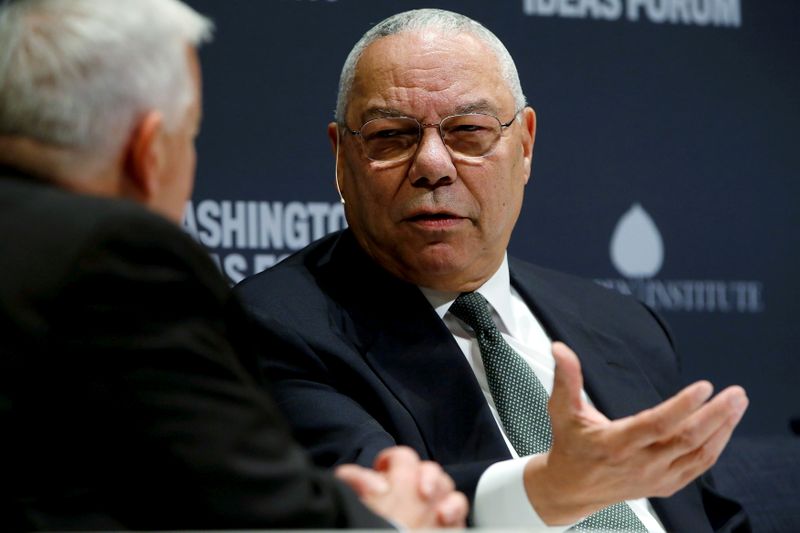By Joseph Ax and Susan Heavey
WASHINGTON (Reuters) - Former Secretary of State Colin Powell on Sunday endorsed Democratic presidential candidate Joe Biden, joining a growing chorus of Republicans and military leaders criticizing Republican President Donald Trump amid nationwide protests.
Powell, a Republican who led the U.S. military during the 1991 Gulf War in Iraq under President George H.W. Bush and later headed the State Department under President George W. Bush, said Trump "lies all the time," has "drifted away" from the U.S. Constitution and poses a danger to American democracy.
"I cannot in any way support President Trump this year," Powell, who did not vote for the Republican president in 2016, told CNN. Trump responded by calling Powell a "real stiff" on Twitter.
The criticism comes as the nation faces a trio of crises: widespread protests over police violence against black men and women, the coronavirus pandemic and a sharp economic downturn. It is rare for Republicans to criticize Trump directly, and more so for members of the military establishment, who typically stay out of politics.
Trump's former defense secretary, retired General Jim Mattis, last week denounced what he called Trump's "deliberate" efforts to divide the country. Former Joint (NASDAQ:JYNT) Chiefs of Staff chairmen Michael Mullen and Martin Dempsey have also criticized Trump's handling of the unrest.
Republican Senator Lisa Murkowski said last week that she was "struggling" with whether to support Trump's reelection, while Republican Senator Mitt Romney praised Mattis' words.
The New York Times (NYSE:NYT) reported on Saturday that George W. Bush would not vote for Trump, citing sources close to the only living Republican former president.
Many of the Republicans now criticizing Trump also did not vote for him in 2016.
Tim Murtaugh, a Trump campaign spokesman, said in a statement, "President Trump has record support within the Republican Party, however the adoration of the liberal Beltway media is alluring and powerfully attractive to some DC insiders."
Since winning the White House, Trump has secured an iron grip on Republican loyalty. Many former critics, such as Senator Lindsay (NYSE:LNN) Graham (NYSE:GHM), have become ardent backers.
CONCERNED REPUBLICANS
Several Republican groups have formed to oppose Trump's reelection, including a super PAC, the Lincoln Project, and a new initiative called Republican Voters Against Trump, which last week kicked off a $10 million digital ad campaign.
"There are legions of privately concerned Republicans in Washington," said Tim Miller, who advised Republican Jeb Bush's 2016 presidential campaign and helped launch Republicans Voting Against Trump.
"That doesn't do a whole lot for me. If you're not willing to say it, you may as well put on the red hat," he added, referring to Trump's signature campaign baseball cap.
Powell said he would vote for Biden, going a step further than some other Republicans who have said they do not support Trump but have not backed his Democratic rival.
"I haven't voted for him, so I'm not going to start now, but that's a different question from actively supporting Biden," said Mark Sanford, the former Republican South Carolina governor who mounted a brief primary challenge to Trump last year.
The public denunciations from figures including Powell and Murkowski could sway more Republicans, Sanford said.

"When these dominoes start to fall, they can fall a lot faster than people think," he said.